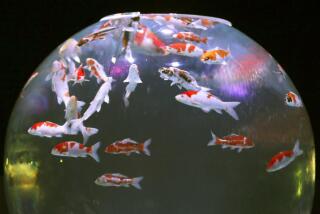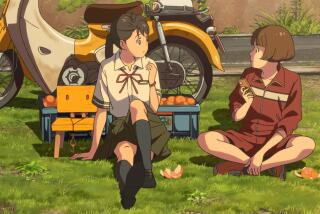Disasters a boon for some firms in Japan
Reporting from Tokyo — Koichi Yamada is living proof of an old business axiom: From the jaws of even the worst disaster springs opportunity.
Yamada works for one of Japan’s top-selling makers of radiation measuring systems. Before the deadly March 11 earthquake and tsunami that ravaged northeast Japan and crippled the Fukushima Daiichi nuclear plant, the company sold 5,000 dosimeters a year. Since the crisis began, orders have exploded to 1,000 a month.
“It’s been like ‘Boom!’ with orders, and we couldn’t get parts to keep up,” said Yamada, department manager at Hitachi-Aloka Medical Ltd. “We’ve been working overtime and fielding the surge of phone calls.”
Japan is still reeling from catastrophes that claimed thousands of lives. But as the nation begins to rebuild, certain products and services are suddenly in demand.
Some were easy to predict. Fukushima Daiichi’s woes have raised the likelihood of power shortages and rolling blackouts this summer. That has presented opportunities for firms that make energy-saving products.
Panasonic Corp. has increased production of high-efficiency LED lights, while Toshiba Corp. is running its domestic lighting factories at full capacity, according to Japanese media reports. NEC Corp. is seeking to boost sales of software that enables companies to monitor electricity usage in their offices and power down equipment when not in use.
Bottled water companies are benefiting too, after radioactive cesium was found in Tokyo’s water supply in late March and tap water was briefly declared unsafe for babies. That order has been lifted for some time. But some consumers aren’t taking chances.
“New contracts for our bottled delivery water has been up tenfold, and we have been flooded with orders,” said Toru Okabayashi, planning director at Toell Co., which sells Japan’s Alpina and Hawaii Water brand waters in the Tokyo metropolitan area.
But managing that gusher of new business hasn’t been easy. Okabayashi said some new customers have to wait as long as two months for service, partly because it’s been tough for Toell to secure additional delivery trucks. They have been in short supply because the quake severely disrupted Japan’s vehicle production.
The calamity has also brought an unexpected new trend: romance. A sense of anxiety after the disaster has some Japanese women stepping up efforts to secure a mate. Memberships in matchmaking services have soared.
“We are getting 20% to 30% more calls to learn about our services compared to before the March disaster,” said marriage advisor Yasushi Miyata of Kaiwa USA in Tokyo. “We get queries from women saying ‘I don’t want to be alone,’” Miyata said.
And with love often comes marriage. At the swanky Takashimaya department store chain, engagement rings and wedding dresses are hot sellers.
“Toward the end of March to mid-April we saw a 30% jump in sales of our bridal accessory brand compared to the same period last year,” said Megumi Ishizuka, spokeswoman for the retailer. “It seemed customers were making commitments to their existing relationships, having a stronger urge to tie the knot or possibly accelerating their wedding plans.”
The radiation measuring devices that Yamada’s company sells aren’t as romantic, but no less essential as Japan rebuilds. Dosimeters, which gauge cumulative radiation levels on humans, cost $400 to $500. The company also makes survey meters, which detect radiation in the atmosphere and on the ground and sell for $4,000 to $6,600.
Manufacturers with factories in the disaster-struck region are trying to secure the gadgets to protect workers sent there to make repairs. The same goes for electric, gas, water and cellphone companies in the region. Hitachi-Aloka Medical’s factories are running at full capacity.
Fuji Electric Co., another leading maker of radiation counters, is also swamped with new orders and is running three shifts at its factory to keep pace.
“We’ve raised our output from making just a few hundred dosimeters a month to 2,000 a month,” Fuji Electric spokesman Toru Ohtatsume said. “We’re only behind on orders by a couple of weeks.”
Nagano is a Tokyo-based freelance writer
More to Read
Inside the business of entertainment
The Wide Shot brings you news, analysis and insights on everything from streaming wars to production — and what it all means for the future.
You may occasionally receive promotional content from the Los Angeles Times.










